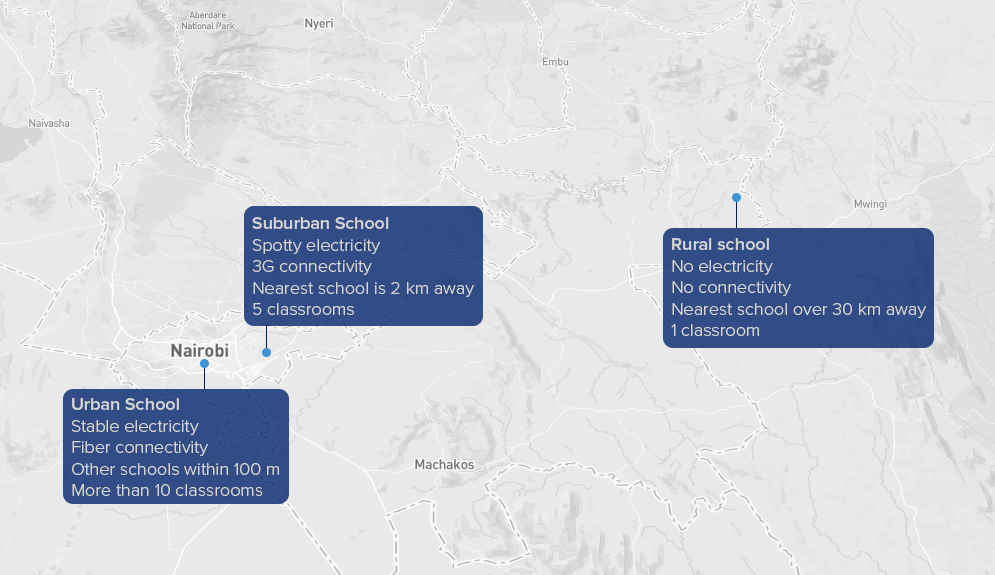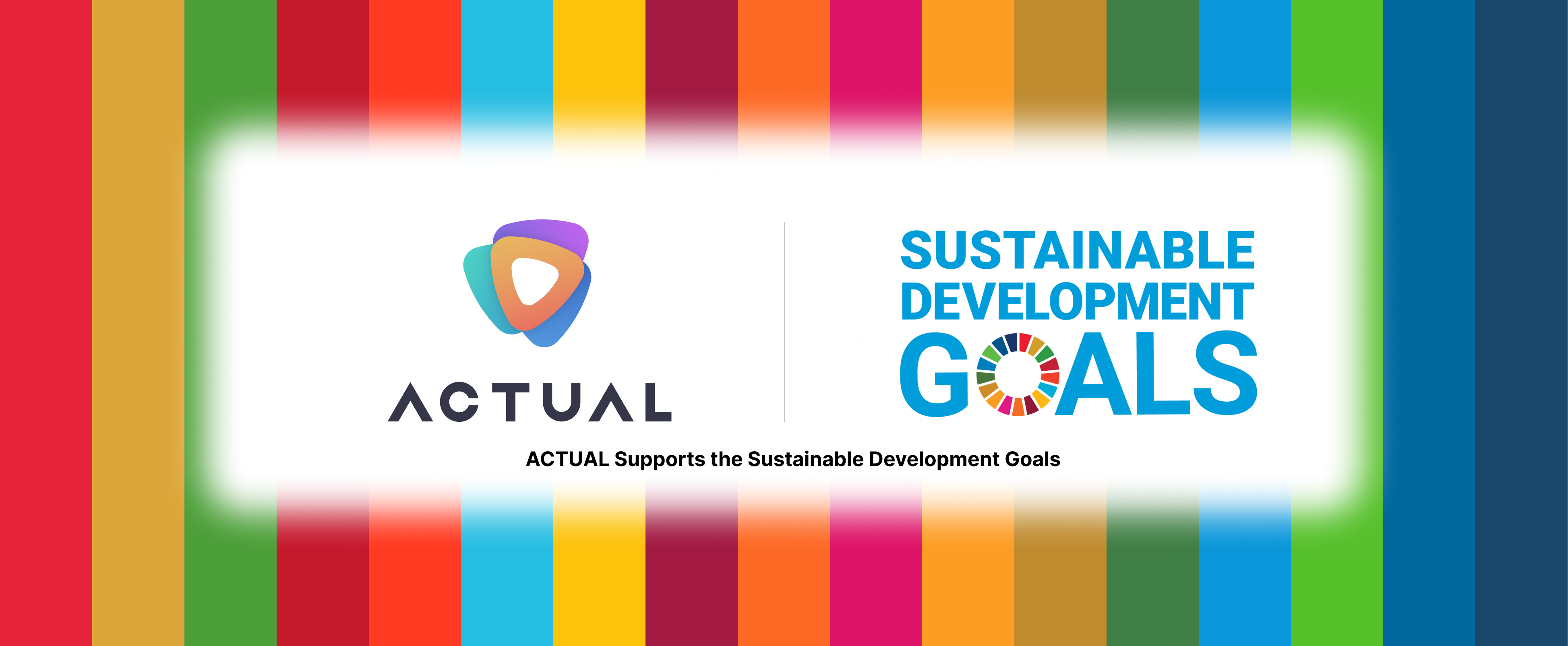26 Apr 2021
Mass Customization is the key to unlocking equity and climate projects

The COVID-19 pandemic has created the largest disruption of education systems in history, affecting nearly 1.6 billion learners in more than 190 countries; school and learning space closures have impacted 94 per cent of the world’s student population. And, even before the pandemic, there were 3.6 billion people in the world without access to the Internet. This disruption in learning – especially those with pre-existing disparities in education and access – threatens to erase decades of progress, as closures of educational institutions hamper the provision of essential services to entire communities. This inequity doesn’t become irrelevant after the COVID-19 pandemic either. In an increasingly connected and digital world, the promise of future learning and living needs innovation and reliable access to the internet to deliver quality education and services.
Actual and UNICEF are partnering to develop an open-source model that is used for high level decision making and planning of various connectivity options. This work is a foundational component supporting Giga, an initiative that aims to connect every school in the world to the internet. Giga was launched last year, led by UNICEF and the International Telecommunication Union (ITU), and with the support of industry leaders including Softbank and Ericsson.
There are hundreds of thousands of schools that lack internet connectivity, and they need to be brought online over the next several years to bring information, opportunity, and choice to young people everywhere. The challenge is that every school and surrounding community presents unique requirements. Even within a single country, there is a large variation in the availability of electricity, the reliability of the grid, available backhaul and cellular infrastructure, and the demographics of local populations and their information and communications needs. Each of the thousands of schools spread across an entire country will have different numbers of students and classrooms, serve varying ages, and have different levels of existing computing resources.

Consider three different schools:
The urban school already has reliable power and fiber in the neighborhood. What they need looks quite different from the rural school which needs connectivity and both on-site electricity generation and storage. The suburban school may only need batteries to keep the internet on during short periods of load shedding, but it does not need generation. A cookie-cutter approach where the same few solutions are applied to every school country-wide clearly will not address the concerns of these individual schools. At the same time, the sheer number of schools that need internet connectivity means that bespoke solutions, designed from the ground up for each location cost too much and are too slow to have a measurable impact at the country level.
Mass customization using common technology bricks adopted across diverse projects is useful in many contexts beyond school connectivity. The scale of challenges posed by climate change to communities and businesses around the world will similarly require the ability to reuse common technology bricks, adapted into the local context. Bespoke projects are too slow to design, finance, and build. The Layer Cake approach allows experts to deliver an exponential increase in the number of projects improving the lives of billions around the world.
Consider a logistics warehouse operator that is looking to achieve net-zero CO2 emissions for their entire network by 2030. Each pillar—such as zero-emissions employee shuttles, parking for EV cars, charging for ZEV trucks, HVAC upgrades, water reclamation projects, on-site power generation, and storage—has several options to select from, and no single option has the emissions reduction needed to achieve net-zero alone.
Actual’s Impact Platform allows projects to meet ESG goals by enabling mass customization of the foundational infrastructure. This begins with a toolbox filled with building blocks representing solutions for each site need, such as power or connectivity. For each need, the best option is selected from the toolbox until a full solution that meets the entire needs of the site is designed. Actual’s Impact Platform speeds up this mass customization process, projecting the costs and impacts at the individual site and rolled-up program levels, and tracking performance throughout the program’s lifetime.
This Layer Cake approach results in outcomes that are optimal for each site while taking advantage of the network effects that come from the widespread deployment of distributed, repeated systems:
Templates for Financing
As the risk factors of a particular solution become established and well known, it becomes dramatically easier to underwrite and finance projects, increasing the speed and reducing the costs of bringing each one to fruition. Stopping climate change will require at least worth of projects; funding must be made as efficient and low-risk as possible.
Scaled Training
Mass adoption of technologies also enables the scalable training of the installers and technicians needed to support these products around the world.
Mass Production
Virtually every technology becomes dramatically cheaper as it becomes more widely adopted, and products that fight climate change and improve equity are no exception. The price of solar has in the last few years as it becomes widely deployed, and it is now the form of energy. As adoption grows, the price drops, further increasing adoption -- a virtuous cycle that virtually every other technology, from EV chargers to batteries to water purification systems, stands to take advantage of.
About Actual:
Actual gives decison-makers confidence as they model and track the cost, impact, and outcomes of sustainable and net-zero infrastructure projects. Visit www.actualhq.com or contact us to learn more about how our platform can help unlock new savings and revenue streams for your projects.
Follow Actual on Twitter and visit our blog to learn more about our other projects and perspectives.
About UNICEF:
UNICEF promotes the rights and wellbeing of every child, in everything we do. Together with our partners, we work in 190 countries and territories to translate that commitment into practical action, focusing special effort on reaching the most vulnerable and excluded children, to the benefit of all children, everywhere.
For more information about UNICEF and its work for children, visit www.unicef.org.
Follow UNICEF on Twitter and Facebook
About Giga:
Some 3.6 billion people in the world do not have access to the Internet. The lack of access to the internet means exclusion, marked by the lack of access to the wealth of information available online, fewer resources to learn and grow, and limited opportunities for the most vulnerable children and youth to fulfill their potential. Closing the digital divide requires global cooperation, leadership, and innovation in finance and technology.
Giga is a UNICEF-ITU global initiative to connect every school to the Internet and every young person to information, opportunity and choice. Connect with us by visiting https://gigaconnect.org and following us on Twitter.
Illustration by Stefan Gustafsson.
Copyediting by Danica Sachs, a writer and editor based in San Francisco.
More recent blog posts
28 Sep 2023

ACTUAL Brings Sustainability Transformation Platform to United Nations Global Compact

Dr. Karthik Balakrishnan
+2 more
ACTUAL joins largest corporate sustainability initiative in the world to contribute to the development, implementation and disclosure of responsible business...
19 Dec 2022

Turning over a New Leaf: How FEMA is Addressing Gaps in Tribal Nations’ Disaster Preparedness Planning

Genevieve Olsen
In the wake of increasingly frequent and powerful natural disasters, many Native American tribes and organizations have been vocal about...
19 Dec 2022

To Reach Net-Zero, We Need to Talk About the Maritime Industry

Genevieve Olsen
When we think about reducing GHG emissions, we often think of what’s on land or in the air. But what...